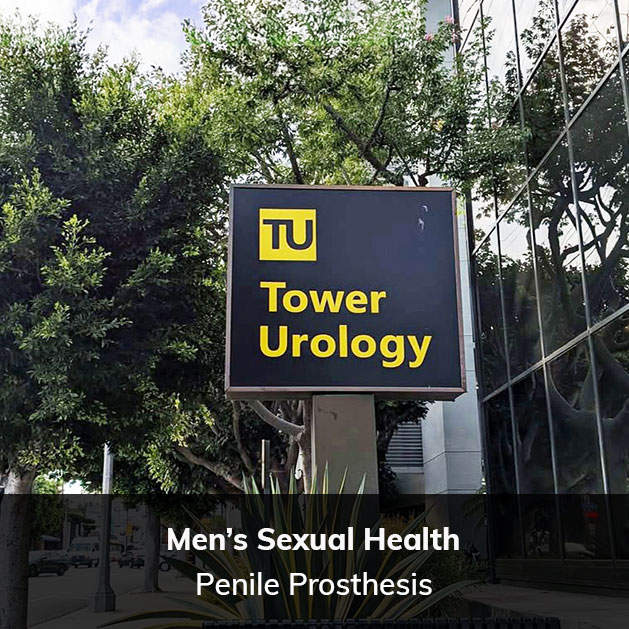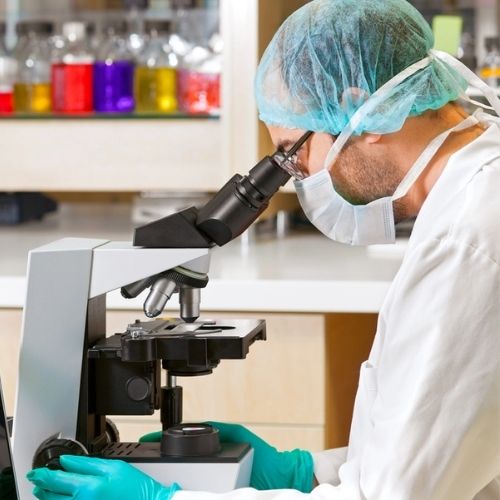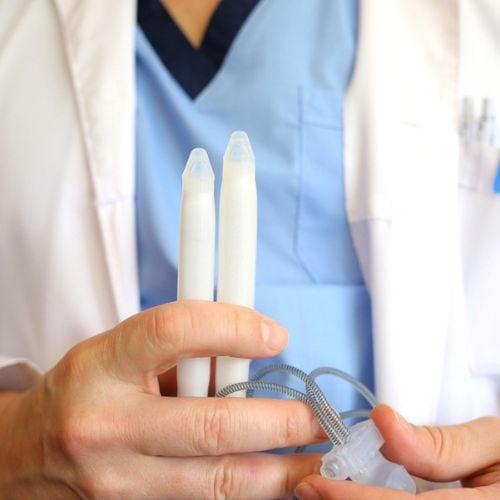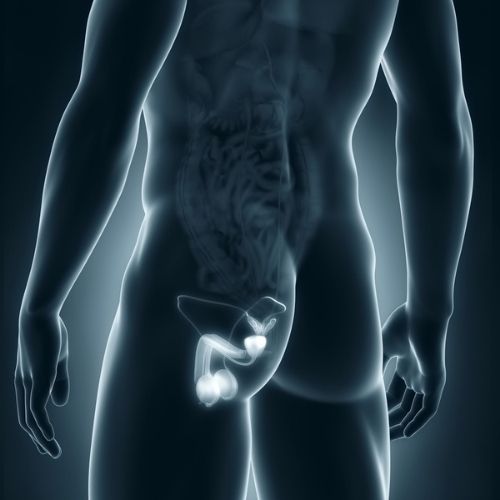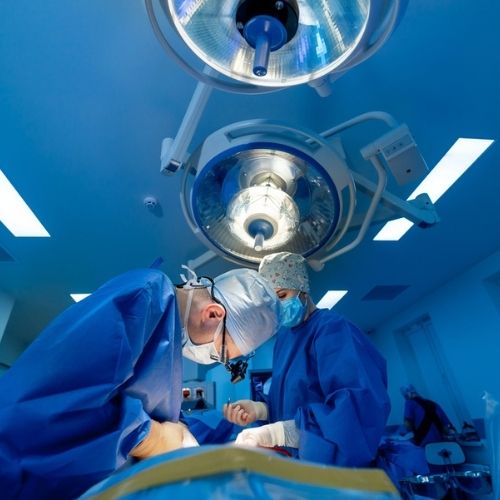What is a penile prosthetic implant?
Penile prosthetic implants are devices which are surgically placed inside the penis. Their function is to create an erection artificially. They are a proven and effective solution for people dealing with severe erectile dysfunction (ED) or Peyronie’s disease. At Tower Urology, our specialists offer advanced, personalized care for patients considering this life-changing procedure.

What conditions does penile prosthesis implantation surgery treat?
Penile prosthetic implant surgery is performed for the treatment of erectile dysfunction in situations such as:
- People who have not achieved satisfactory results with medications, injections, or other therapies for erectile dysfunction (ED)caused by vascular, neurological, or psychological factors.
- Those who have Peyronie’s disease and experience severe curvature, significant penile deformity, or ED resulting from scarring, making sexual activity difficult or painful.
- Anyone who experiences post-prostate surgery ED after a prostatectomy or pelvic radiation.
- Anyone who desires a permanent, reliable solution to achieve and maintain erections.
Who is a good candidate for a penile prosthesis implant?
Ideal candidates include people who:
- Have chronic, severe ED unresponsive to other treatments.
- Are in good general health and cleared for surgery.
- Have realistic expectations about the procedure’s outcomes.
- Desire a long-term, maintenance-free solution for achieving erections.
Are there different penile prosthesis implant types?
Yes. There are two categories of implants: inflatable devices (inflatable cylinders) and semi-rigid implants. After carefully considering your medical condition, lifestyle, and personal preferences, we will work with you to select the best implant for your specific needs.
What are inflatable implants?
There are three types of inflatable penile prosthesis.
Three-piece inflatable penile implant—This is the most sophisticated option. Two cylinders are placed in the penis. A pump is placed in the scrotum, and a fluid reservoir is inserted into the abdomen. When activated, this implant pumps saline solution (salt water) from the reservoir into the cylinders, creating the most natural-feeling erection.
Two-piece inflatablepenile implant—This option resembles the three-piece inflatable prosthesis model. The difference is that the reservoir and pump are placed in the scrotum. While simpler in design, the two-piece still provides good rigidity and concealment.
One-piece inflatable penile implant—This version contains saline solution at the end of each cylinder in the penis. Although it offers a simpler design, the results are less natural.
The advantages of inflatable devices are a more natural look and feel, better concealment when not in use, and greater control over erections.
Semi-rigid implants
Semi-rigid penile implants are non-inflatable. Essentially, they are bendable rods that remain firm at all times. The penis can be positioned upward for sexual activity and downward for concealment. They are particularly suitable for people with limited use of their hands or fingers. As a result, they might have difficulty operating the pumps in the inflatable options.
There are several advantages of semi-rigid implants. First, they are simpler to use. In addition, they are less complicated mechanically (fewer parts). This means a lower risk of device failure and a more straightforward surgical procedure.
Please note that both categories of implants are completely concealed within the body and can provide effective treatment for erectile dysfunction.
What happens during penile implant surgery?
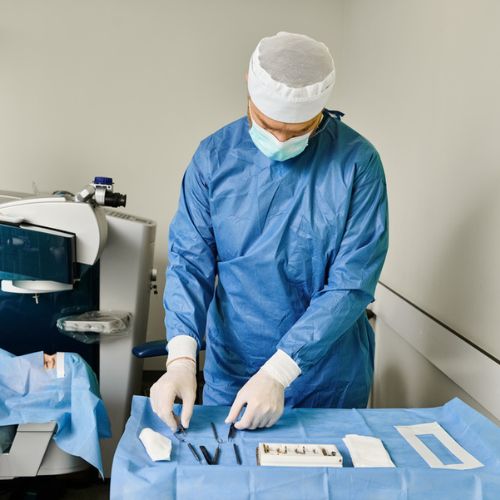
The procedure is typically performed under anesthesia, so you will not feel pain or discomfort. The surgery involves the following steps:
- Preparation: The surgeon makes a small incision (opening) at the base of your penis or in your lower abdomen.
- Implant Placement: A device (either inflatable or semi-rigid) is inserted into your penis.
- Customization: The implant is tailored to fit your anatomy for natural appearance and functionality.
- Closure: The incision is closed, and the device is tested to ensure it functions correctly.
The procedure typically takes between one and two hours. It can be performed on an outpatient basis or with a short hospital stay. Read more about penile implant surgery.
What are the immediate side effects of penile implant surgery?
Whether you are hospitalized overnight or go home the same day, you will have a small catheter (flexible tube) in place to help you empty your bladder. Our patients all recover slightly differently, but most experience the symptoms below.
On the day of the procedure, you will probably experience:
- Bruising and mild bleeding from the incision.
- Minor bruising at the IV site.
- There may be pain at the site of the operation, the bladder, and the urethra.
24 to 48 hours after your surgery, you will probably experience:
- Swelling and pain that feels worse than on the day of your surgery. However, you have the option to control this with pain medication.
- Possible bladder and urethral discomfort.
- Some trouble initiating (starting) a regular urinary stream.
72 hours after surgery, you may experience:
- Increased swelling and bruising of your penis.
- Possibly some pain and sensitivity around your scrotum and testicles.
- Maybe some pain in your lower abdomen region.
What is its success rate? How effective is it?
Penile implants have an exceptionally high success rate. Because we pay close attention to each client, our patient satisfaction rates exceed 90% for both patients and their partners.
Implants are designed to provide reliable, on-demand erections, improving sexual performance and quality of life. They are usually highly effective.
What are the risks and complications associated with penile prosthesis implantation surgery?
As with any surgical procedure, there are potential risks, including:
- Postoperative infection (risk of infection after the operation)—However, this is very rare, especially with modern antibiotic protocols.
- Mechanical failure of the implant—Again, current advancements and state-of-the-art devices mean that such a risk is low.
- Temporary pain or swelling during recovery.
At Tower Urology, we take our professionalism and responsibility very seriously. Our team takes every precaution to minimize risks and ensure successful outcomes.
How long does it take to recover from penile implant surgery?
- Immediate recovery: Most patients can return home the same day or after an overnight stay.
- Post-surgery: Expect some swelling and discomfort for the first week, which can be managed with medication.
- Resuming activities: Most people can resume non-strenuous activities within 1-2 weeks and sexual activity after 4-6 weeks.
- Long-term benefits: The implant provides consistent, on-demand erections without additional treatments.
Are there other treatments to consider?
Yes, other treatment options for ED or Peyronie’s disease may include:
- OralMedications: PDE5 inhibitors, such as Viagra or Cialis.
- Injection Therapy: Medications injected directly into the penis.
- Vacuum Erection Devices (also known as penis pumps or vacuum constriction devices): These are non-invasive options for people with mild to moderate ED.
- Shockwave Therapy: A non-invasive approach to improve blood flow in ED patients.
Read more about alternative treatments for ED.
Why Tower Urology is your best choice for penile prosthesis implantation surgery in Los Angeles
If you are considering a penile implant, we emphasize that this procedure is a highly effective and transformative option for restoring sexual function. While the decision may feel frightening, satisfaction rates are incredibly high. Most people and their partners are thrilled with the results.
We encourage you to speak openly and freely about your goals, concerns, and expectations with our urologists during your consultation and follow-up appointments. We are here to listen and help.
At Tower Urology, we provide the support and expertise you need to make an informed decision and achieve the best possible healthcare outcome.
Tower Urology is a leader in men’s health, offering advanced expertise in penile implant surgery. What makes us unique:
- Highly Skilled Surgeons: Our team has extensive experience in penile prosthetic implantation, ensuring precision and successful outcomes.
- Customized Care: We tailor each procedure to your unique needs, anatomy, and lifestyle.
- Advanced Technology: We utilize the latest surgical techniques and high-quality implants to achieve optimal results.
- Comprehensive Support: From initial consultation to post-operative care, we give you personalized support every step of the way.
For expert care of penile prosthetic implants, contact Tower Urology today to schedule a consultation. Our dedicated team is here to help you take the next step toward a more fulfilling life.
We invite you to establish a care plan with Tower Urology.
Tower Urology is conveniently located for patients throughout Southern California and the Los Angeles area, including Beverly Hills, Santa Monica, West Los Angeles, West Hollywood, Culver City, Hollywood, Venice, Marina del Rey, Burbank, Glendale, and Downtown Los Angeles.
At Tower Urology, we treat a wide range of men’s health conditions, including premature ejaculation, erectile dysfunction, low testosterone, chronic pelvic and testicular pain, prostatitis, vasectomy and vasectomy reversal, penile implants, shockwave therapy, male infertility, enlarged prostate, incontinence, and support for men undergoing or recovering from prostate cancer treatment. Our specialists are committed to helping you regain control, confidence, and satisfaction.
Penile Implant FAQs
Yes. Penile implant surgery generally does not interfere with your ability to ejaculate or experience orgasm. The implant is placed inside the corpora cavernosa and does not affect the nerves responsible for sensation or sexual function.
During sexual intercourse, your partner typically cannot tell the difference between a penile implant and a natural erection. Studies show extremely high satisfaction rates among partners, with 94% reporting satisfaction with the natural feeling of penetration.
Penile implants typically last between 15 and 20 years, with many devices showing remarkable longevity before a new implant may be needed. Studies demonstrate that after 20 years, approximately 60% of patients are still using their original implants.
There is a wide range of costs for penile implant surgery, depending on the type of prosthetic that is best for you. So, the United States has a ballpark range of $10,000 to $35,000. Depending on your insurance coverage, the cost of hospital/facility fees, anesthesia, the implant device itself, etc., can vary.
Medicare will generally cover penile implant surgery when it’s deemed medically necessary for treating erectile dysfunction. Medicare typically covers 80% of the cost. If you have it, secondary insurance often covers most of the remainder.
Sources
Penile Prosthesis Surgery: Current Recommendations From the International Consultation on Sexual Medicine
https://academic.oup.com/jsm/article-abstract/13/4/489/6940424?redirectedFrom=fulltext
First Outcomes of the ZSI 475 FtM, a Specific Prosthesis Designed for Phalloplasty
https://academic.oup.com/jsm/article-abstract/16/2/316/6980544?redirectedFrom=fulltext
The International Penile Prosthesis Implant Consensus Forum: clinical recommendations and surgical principles on the inflatable 3-piece penile prosthesis implant
https://www.nature.com/articles/s41585-022-00607-z

